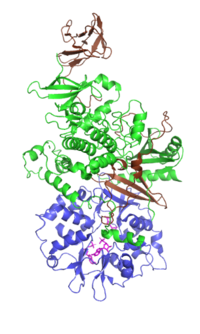
Photo from wikipedia
PURPOSE There is a strong association between attention-deficit/hyperactivity disorder (ADHD) and alcohol abuse, yet no studies have systematically assessed the effect of alcohol on the pharmacokinetics of psychostimulants such as… Click to show full abstract
PURPOSE There is a strong association between attention-deficit/hyperactivity disorder (ADHD) and alcohol abuse, yet no studies have systematically assessed the effect of alcohol on the pharmacokinetics of psychostimulants such as amphetamine (AMP) in vivo. This study evaluated the effects of alcohol on the rate and extent of absorption of Adzenys™ XR-ODT*, a new extended-release orally disintegrating AMP tablet (AMP XR-ODT) for ADHD. METHODS A Phase I single-dose, open-label study was conducted in 32 healthy adults. Participants were split into 2 cohorts, allowing for close monitoring of safety profile and tolerability, and were randomized 1:1:1:1 to receive treatment in 1 of 4 sequences. Each treatment included the administration of a single 18.8-mg dose of AMP XR-ODT, followed by 240 mL of deionized water or 4%, 20%, or 40% ethanol. Blood samples were collected at prespecified time points. The pharmacokinetic profiles of d- and l-AMP were comparable across treatment groups. FINDINGS There was no change in the extent of absorption for d- or l-AMP with alcohol coingestion and no dose dumping of the extended-release portion of the formulation. The 90% CIs for the geometric mean ratios (4%, 20%, and 40% ethanol versus water) for Cmax and systemic exposure (AUC0-5, AUClast, and AUC0-∞) were within 80% to 125%. Adverse events were mild to moderate and were consistent with the known adverse event profile for AMP XR-ODT or alcohol. IMPLICATIONS Varying concentrations of alcohol (4%-40%) did not significantly alter the pharmacokinetic profile of AMP XR-ODT. These findings are relevant to clinicians who have concerns about alcohol use and/or abuse when treating ADHD.
Journal Title: Clinical therapeutics
Year Published: 2017
Link to full text (if available)
Share on Social Media: Sign Up to like & get
recommendations!